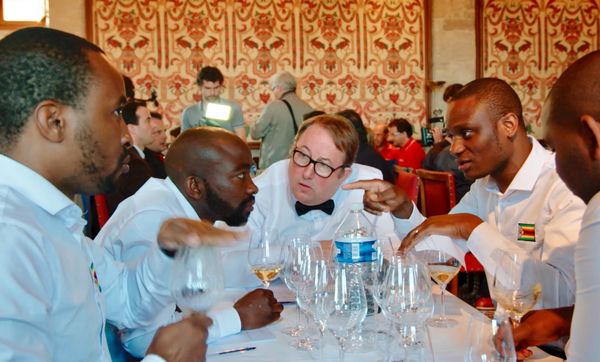 |
| Team Zimbabwe - Tinashe Nyamudoka, Pardon Taguzu, Joseph Dhafana, and Marlvin Gwese in discussion with coach Denis Garret in the middle at the fifth World Wine Tasting Championships. |
When I spoke with Tribeca Film Festival Artistic Director Frédéric Boyer from Paris on the line-up for the 20th anniversary edition, he called Warwick Ross (Red Obsession, co-directed with David Roach and narrated by Russell Crowe) and Robert Coe’s Blind Ambition “super good.” Joseph Dhafana, Tinashe Nyamudoka, Marlvin Gwese, and Pardon Tagazu, who are all living and working in South Africa, formed team Zimbabwe to compete against 23 countries (the Québecois counting Québec as a country) in the fifth World Wine Tasting Championships, held in Burgundy, France at the Château de Gilly.
![Robert Coe and Warwick Ross with Anne-Katrin Titze on Claude Lelouch: “While we were at his atelier, we noticed that there was a [Citroën] 2CV sitting in the driveway.”](/images/newsite/Robert_Coe_Warwick_Ross_Anne-Katrin_Titze_225.jpg) |
| Robert Coe and Warwick Ross with Anne-Katrin Titze on Claude Lelouch: “While we were at his atelier, we noticed that there was a [Citroën] 2CV sitting in the driveway.” |
Blind Ambition (co-written with Paul Murphy and Madeleine Ross), a highlight of the festival, takes us on their journey, showing the obstacles and hardship each one had to overcome while fleeing Zimbabwe to make it first in a country not familiar to them and second the wine-tasting training (with Jean Vincent) and coaching (by Denis Garret) that they took on for the competition.
From Sydney, Australia, Warwick Ross and Robert Coe joined me on Zoom for an in-depth conversation on Blind Ambition.
Anne-Katrin Titze: Hi!
Warwick Ross: Hi, how are you Anne-Katrin?
AKT: I’m fine! How are you?
WR: Lovely to see you! This is Rob!
Robert Coe: Nice to meet you!
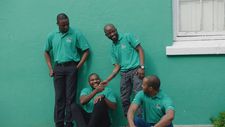 |
| Robert Coe: “Having met them in person, we realized they were very cool, they had a lot of swagger.” |
AKT: Hi Rob! Nice to meet you. You are both in the same frame! Where are you?
WR: We are in Sydney, Australia.
AKT: So it’s good morning!
WR: Yes, good evening for you!
AKT: How are the olives?
WR: Oh thank you for asking! A small harvest but a very good harvest.
AKT: ’21 is good?
WR: ’21 is good, yeah. I wish I could send you a bottle.
AKT: That would be lovely.
WR: I’ll bring one, if I get to come, I’ll bring one for you.
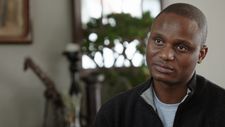 |
| Team Zimbabwe member Joseph Dhafana |
AKT: You like titles with a certain rhythm, Red Obsession, Blind Ambition. Frank Capra’s Lost Horizon fits with this, about Shangri-La.
WR: I think we’ll use that for the next one.
AKT: The idea to make a film about the wine tasting Olympics and a team from Zimbabwe, how did it start? What was the kernel that made this film possible?
WR: Anne-Katrin, you remember Red Obsession, you won’t remember the people in it, I’m sure. But there was a person interviewed in that, her name was Jancis Robinson, who is probably the foremost wine writer, certainly the foremost in the UK. She knew that we were looking for another film and we asked her to keep an ear out for any interesting story. She had been in South Africa and met these guys and sent us an e-mail saying you really should talk to these guys. That was the spark of the story. Then Rob and I Zoomed with them for an hour one afternoon and we were just totally charmed by these four guys. Their aspirations were incredible because it was so far against the odds. And the quirky nature of a team from Zimbabwe, which is a country that has no wine culture. It was the collision of all those interesting things.
 |
| Team Zimbabwe member Tinashe Nyamudoka |
RC: The first thing that came to mind after having heard the story from Jancis was, this is the Cool Runnings of the wine world. When we did Zoom with them, one thing that made us really chase the story was the fact that a team of four, who had all escaped Zimbabwe, who were all working in wine - what were the different characters going to be like? And they immediately presented that one was a philosopher, one was the serious guy, one was the joker, so it was a really interesting array of characters.
AKT: They are wonderful. Each one of them is terrific. I love when you have them walk in slow motion next to each other, it’s like Charlie’s Angels or superheroes. And when they are wearing the jackets with the numbers, they are never in order. Can you talk a bit about the artistic choices made to present them to us?
WR: The artistic side of it, just from a colour and design point of view, because they are from Zimbabwe and they have such a passion for their country - a country that they don’t even live in anymore, the love for their country draws them to their flag. Their flag has all those colours, so immediately the guys liked to wear the yellow and the red and the green and the black. It was this kind of Mondrian design of these guys. That just fell into place. The fact that they’re so charismatic and they’re all handsome, that just leapt off the screen for us.
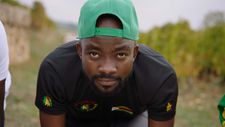 |
| Team Zimbabwe member Pardon Taguzu |
RC: Having met them in person, we realized they were very cool, they had a lot of swagger. Warwick and I always spoke about it felt like four gunslingers from an old Western. Reservoir Dogs was actually the reference for that. These guys bonded together, they were a unit.
AKT: You are also teaching your audience a few words from, for most of us, a new language. “Kumusha” it starts with, meaning roots and origin and home. And later “Ubuntu”, the art of sharing. I like the bracket of the film with language.
WR: It flowed naturally from the guys. When they do a tasting, they lapse into their own language. When they’re on their own, it’s always in Shona. They have particular expressions and particular fruits that grow in the mountains and these inaccessible areas in Zimbabwe which they grew up with. So it was the link between that fruit that they remembered from their childhood and a smell or a sense that they get in the wine, there’s such a strong tie between those two things.
As Tinashe says in the film, “the blackberries and the blueberries, we knew nothing about those. That’s kind of a western concept for us. These other fruits that grew wild in Zimbabwe, we really love.” We loved the idea of starting with the word Kumusha, meaning roots and origins, because we felt very early on that this was a story of origin. No matter where these guys were taken or forced to go in the world, this umbilical tie back to their origin was such a strong one. We wanted to end in the mountains with Tinashe, his grandfather’s mountains, where he was taken as a kid, where he found those fruits.
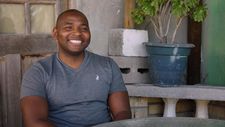 |
| Team Zimbabwe member Marlvin Gwese |
AKT: The berries, I found to be a fascinating moment. I think it is Tinashe who speaks about buying strawberries and blueberries in the supermarket in order to practice for the wine tasting. Of course every region has its own berries and we all have our different associations with them.
RC: Especially with Kumusha and Ubuntu - it’s a word that doesn’t translate exactly into English, it’s a feeling, it’s an emotion. It was the journey we wanted to take the audience on as well.
AKT: Just as an aside, yesterday I started my summer course on fairy tales and storytelling and one student signed up to present a folktale from Zimbabwe. A lovely overlap. Of course we have to talk about Denis [Garret]. He is an unbelievable find for a film! You just wonder what is going on in his head! You had the guys first and then Denis came on board?
WR: Yeah, that’s how it happened. Joseph had known Denis from years before. Denis lived in South Africa in Cape Town and he had an incredible reputation when he was a younger man, being one of the finest wine tasters in the world. Denis really has a reputation in Champagne, I think of all the people who can taste and identify Champagne, Denis is in the top two or three. Or was. I’m not sure he still is. But the guys needed a coach, and JV [Jean Vincent] had made it clear to them that he couldn’t do both teams but that he was happy to help out until they found somebody.
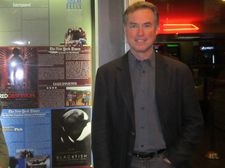 |
| Warwick Ross in New York for Red Obsession Photo: Anne-Katrin Titze |
Then Joseph or JV suggested to the other, why don’t we use Denis, he’s in Europe, he’s great and fun. The guys all responded because Denis is kind of a larger than life character. He’s crazy and he’s wonderful and he’s generous to a fault. I mean, he’s flat broke, but any money that he has, he’ll spend it on the most expensive wine and immediately share it with you. So if you happen to be there on that night, he’ll open the wine and share it with you. He does that with the guys too, but in terms of managing his own life, he is hopeless at it. And he just fell into our laps. We expected the guys would have chosen some real hotshot, but Denis was this dysfunctional character, which for the film was just great.
AKT: The film is building up to the big day of the competition and it came as a surprise for me that it all takes place in one big messy room. Was it difficult to get permission for you to be there as well and to film?
RC: The competition is hosted by La Revue du Vin de France. When we told them we were following the Zimbabwean team, they were very open to the idea of allowing us to film. Because they saw how compelling the story was. We did deal with Philippe de Cantenac, who is the head of the competition. So how do we cover this entire competition? There’s a room full of twenty-four teams. We had to have cameras on all of them, at the same time focusing on our guys. We had no idea at the time we were shooting how long the competition would represent in the film. It was quite an administrative nightmare, but it was a lot of fun. Almost an oxymoronic calm cacophony, because every team was talking, but in their own dialect. So you had the Chinese team speaking Mandarin, the Zimbabweans speaking Shona, the Brits speaking English, it all worked, you were still able to hear yourself think. It did surprise us how the competition was held in that manner as well.
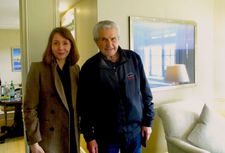 |
| Claude Lelouch with Anne-Katrin Titze in New York: “There are as many cars in my films as there are horses in westerns.” Photo: Anne-Katrin Titze |
AKT: It also surprised me how fascinating the training footage was. Although you can’t taste a thing watching the movie.
WR: Yeah, there was one element in the film you may remember where one of them, I think it’s Joseph, says a particular word in Shona and JV says “What? What are you talking about?” And Joseph says “tree bark!” And that’s the word they are using from their own language, very fresh tree bark. Pull the tree bark off and smell the tree bark, that’s what we’re getting in here. And the other guy says “Then we’re in Italy.”
AKT: It connects everything and is beautifully cumulative. You also have moments that are extremely powerful in a different sense. When Joseph describes how he arrived from Zimbabwe, this freight train ride, hearing him describe it brings up images of the Holocaust.
WR: Yeah, I mean the whole refugee aspect, and it’s the strongest with Joseph, obviously. Horrifying stories. The stories that we also get of the African refugees in France, or when they get from France into England, being locked in trucks. And trucks being abandoned and people dying on the side of the road in their teens and twenties and thirties. And this is what Joseph and [his wife] Amelia experienced in that train. We had a much longer version, as you often do, but Joseph’s story, running out of air in that carriage was just horrendous. People falling and fainting all around him. Women were falling and men would fan them with their shirts to keep them cool, but the guys then ran out of air and began collapsing in on everybody else. Two or three men who were still able were pounding on the carriage.
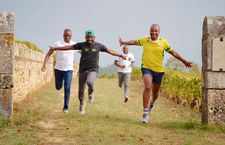 |
| Warwick Ross: “The fact that they’re so charismatic and they’re all handsome, that just leapt off the screen for us.” |
It was just by luck that one of the railway officials happened to be walking past. I think it was a guard who heard the pounding and he had a key to the lock. And Joseph said that he physically fell out of that door onto the tracks, gasping for air. And when he looked at his skin, his skin had turned white! There’s some physiological thing that happens with the lack of oxygen, the pigment of the skin begins to change. We needed to show the extreme of Joseph’s experience, in order for us to realize and appreciate just how much drive he has. His drive to succeed is extraordinary, it’s the strongest of the four.
RC: I think it was really important as well to extrapolate this story in the context of what’s happening now. Joseph’s story speaks to almost every refugee that’s been dislocated from their home. This is what they do to find a better life. It was really shocking hearing Joseph tell us that. You couldn’t help but well up. He’s left his two-year-old son behind and he and his wife embarked on that journey. To see what he has achieved and the economic stability he brought his family, it’s all part of this greater story to tell and shine a light on refugees.
AKT: Your film is still very hopeful. You have that line “The world of wine is very bad at diversity.” You show the castles and the splendour and at the same time the two sides merge in what you’re depicting.
WR: With Red Obsession, just harking back to that film again for a minute, one thing that was very evident to Rob and me on that film was that every tasting we went to, every chateau we went to, every interview we did, everyone was white. The world of wine has been incredibly white, traditional, conservative. The Chinese were making their presence felt - Red Obsession shows what was happening there at the time, about ten years ago. But there has been very few people of colour in the wine world and it’s evident in that room, that big crazy room of competition.
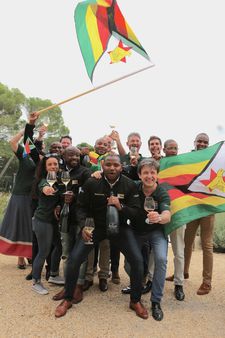 |
| Warwick Ross: “They have such a passion for their country - a country that they don’t even live in anymore, the love for their country draws them to their flag.” |
Stand back and have a look at that room! There are four Black guys in there. Basically everybody else, besides the Chinese team, is a white team. So these guys are breaking down those doors and the white bastion, that has been holding strong for such a long time. And Jancis very strongly supports this diversity push and of course if it weren’t for Jancis the guys wouldn’t have had the money to get to the competition. White faces wall to wall as you said, and as she said. It was important for us to explore this changing world. Diversity is having effects all over the place right now, and the wine world is no exception. And I think these guys are the vanguard really.
RC: It also was interesting from a story perspective. It wasn’t all about how far they went in the competition, it was the fact that they got there. That was the major success. Initially we were wondering how they were going to go, if they come last, if they come first. It would affect the story. We both sat back and said, you know what? It actually doesn’t matter. It’s just the fact that they get there.
AKT: Although, when I spoke with Frederic Boyer, the Artistic Director of Tribeca, he said “They beat the Italians!” One little thing that I noticed in the end credits is the you have Les Ateliers du Cinéma de Claude Lelouch involved! Claude Lelouch was involved in your film?
WR: You picked that up!
RC: Amazing.
WR: You are the first person to mention that actually! Yes, we were in Burgundy and we needed to film in certain places. And Claude Lelouch has his film school in Beaune. Attached to that is a little cinema, which they said if you need to screen, you can screen here. But what we needed and what we got him to help us with was students to bring the cameras from the school. So on that big day at the competition, we had, I think, ten cameras running. We brought three or four of them and the other six or seven were provided by Claude Lelouch and the students. While we were at his atelier, we noticed that there was a [Citroën] 2CV sitting in the driveway. And I commented on it. I said “Oh my god, this is brilliant, I love this 2CV.” Ah, this belongs to Mr. Lelouch.
AKT: He loves cars! When I interviewed Claude Lelouch, he went on and on about cars. We talked about an early film of his, Le Voyou, where a Simca is in the centre. But please continue!
 |
| Robert Coe and Warwick Ross crack up when I told them that Frédéric Boyer said with delight about Team Zimbabwe: "They beat the Italians!" |
WR: All I did was make the comment how stylish and wonderful I think the 2CV is, and the offer came immediately. “Would you like us to drive the guys to the competition?” And we said “Yes, that would be great.” We asked the guys and they loved the idea, of course. That’s how the 2CV ended up bringing the guys actually on the morning of the competition.
AKT: That’s wonderful. Did you meet Claude Lelouch?
WR: No, he wasn’t in town. He was in Paris unfortunately.
AKT: He has some of the greatest car rides in film history. I don’t know if you’ve seen his latest film, where he mixes in the drive through Paris from Un homme et une femme. Jean-Louis Trintignant driving Anouk Aimée.
WR: I’ve got to see that. Fantastic.
AKT: What’s coming up for you next?
RC: At the moment I’m working on another feature documentary on the life of Mick Doohan, the five time MotoGP champion from ’94 to ’98. An incredibly strong comeback story.
WR: That’s on one hand, on the other hand, we have a brilliant true story, but this one is going to be a scripted feature. Of four Australian rugby players, who always dreamed of representing Australia, but never quite got to that level. They thought their opportunity was gone, until one read in a newspaper that there was a world sudoku competition happening in India. And if they could only learn to play sudoku, this could be their opportunity to represent Australia, which they did.
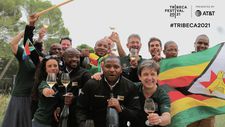 |
| Blind Ambition is a highlight of the 2021 Tribeca Film Festival |
AKT: You have a knack for picking the most absurd combinations!
WR: Yes, I think we do like the bizarre.
AKT: And will the title have four syllables?
WR: You have to wait and see.
AKT: Thank you so much, lovely to speak to you across the world. Have a good morning!
WR: Have a good evening! We’re very sorry not to be in New York and do this interview with you in person, we were so looking forward to coming and it’s just been impossible.
The Brooklyn Commons at MetroTech Blind Ambition screening on Thursday, June 10 at 8:00pm was SOLD OUT. The documentary is available to stream on demand through Wednesday, June 23.
This year's Tribeca Film Festival has moved from its regular spring dates in response to the pandemic and will run through June 20. There will be in-person and drive-in events and, for the first time, the festival will have venues across the city's five boroughs.





















